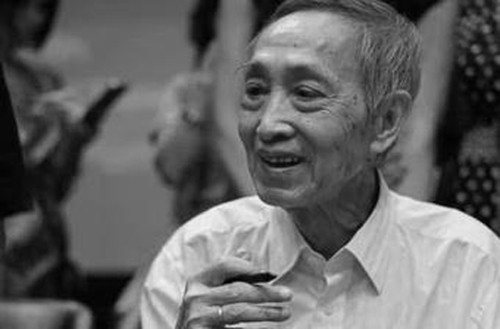As the translator of more than 50 literary works of French, Russian, English, American, German, Greek, Brazilian, Japanese, and Norwegian writers, Duong Tuong was praised by generations of Vietnamese people as a messenger of international literature, who brought the magic of the world's most famous books to Vietnamese readers.

Translator Duong Tuong has passed away at the age of 91.
The slight wordsmith often appeared at gatherings of elite intelligentsia and colorful artists. But the fragile look hid a stubbornness who was tireless in working with words.
As the translator of more than 50 literary works of French, Russian, English, American, German, Greek, Brazilian, Japanese, and Norwegian writers, he was praised by generations of Vietnamese people as a messenger of international literature, who brought the magic of the world's most famous books to Vietnamese readers.
Thanks to Duong Tuong's diligent work, generations of Vietnamese have been fortunate enough to be able to read great works such as Leo Tolstoy's Anna Karenina, Margaret Mitchell's Gone With the Wind, Albert Camus' The Stranger, Emily Bronte's Wuthering Heights, The Tin Drum by Günter Grass, and last but not least, Lolita by V. Nabokov.
Duong Tuong once said: “Literary translation is a bridge connecting readers (including writers) who do not know foreign languages with the treasures of mankind's wisdom. And a passionate literary translator is someone who is voluntarily a kind of pipe to absorb and convey those essences to those who want to receive them,” (Sweet as my coffee, Van Nghe Publishing House, 2010, Ngo Thi Kim Cuc).
Duong Tuong not only voluntarily assumed the responsibility of bringing the breath of world literature to Vietnamese readers, but also carried out the mission of a mediator for cross-cultural transfer with great effort and remarkable perseverance.
At the age of 88, he completed the translation into English of Truyện Kiều (The Tale of Kiều), a classic work of poetic stories by poet Nguyen Du, considered a monument to Vietnamese literature.
Asked how he, almost deaf and half blind, could read the poems with a length of 3,254 verses and translate them into English, he smiled and said: “Truyện Kiều is already in my head. I just switched to English.”
That means he memorised more than three thousand of those verses, and he only had to act as a "pipe" to "transmit" the immortal verses of the Vietnamese people into English.
For more than two and a half years, his fingers tapped at the keys, allowing him to complete the last work of his life, which he affectionately called the swansong.
Duong Tuong experienced turbulent periods of the country. He participated in the resistance against French colonialism three years after it started. He was also one of the early reporters and editors at the Vietnam News Agency, from 1955 to 1964.
Although a large part of his life was associated with war, suffering, and poverty, behind Duong Tuong’s appearance lies the innocent soul of an "incurable dreamer", the word used by late journalist Nguyen Khuyen, a longtime friend of his.
“Duong Tuong was a dreamer with a strongly marked artistic turn of mind. He had no use for mundane, trivial things, totally divorced from ambitious motives that normally drove other men in the rat race for power and wealth. He was never seen without a book even while walking down the streets, untroubled by worries about everyday life,” Khuyen wrote in the preface to the book Kiều in English translated by Duong Tuong.
With that innocence, Duong Tuong walked leisurely into many artistic paths. He identifies himself as a person who is "passionate about everything": literature, poetry, music, painting, cinema, etc.
If translating is his way of bringing the world's elite culture to Vietnamese readers, then poetry and painting are the fields that he wanted to wander to discover and innovate. And so leisurely, he now slowly enters a pure and silent world.
Duong Tuong was a contributing short story translator and arts writer to the Việt Nam News in its early days from 1991-1999.
Source: Vietnam News